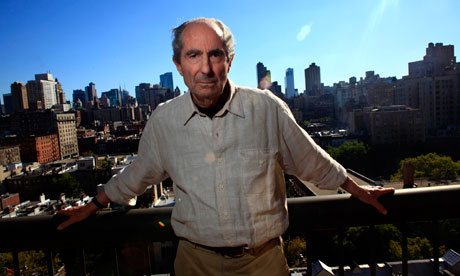http://www.guardian.co.uk/books/2011/may/21/philip-roth-protest-feminism-virago

Philip Roth protest had nothing to do with feminism, says Virago founder
Carmen Callil defends decision to quit Booker panel and says dislike of author based on literary shortcomings

Carmen Callil says in the Guardian Review that Philip Roth ‘digs brilliantly into himself but little else is there’ .Photograph: Eric Thayer/Reuters
The founder of the feminist press Virago who withdrew from the judging panel of the Man Booker International prize over its decision to honourPhilip Roth has dismissed criticism that her decision was driven by Roth's portrayal of women.
Publisher and author Carmen Callil caused a literary storm when she announced she had retired from the award's panel of judges because she did not "rate [Roth] as a writer at all".
"He goes on and on and on about the same subject in almost every single book. It's as though he's sitting on your face and you can't breathe," she said.
Callil's comments about the author most often tipped to win the Nobel prize in literature for the United States caused uproar. Toby Young called her a "petulant prima donna" in the Telegraph, while Observer critic Robert McCrum wrote that, as "an ebullient and pioneering feminist publisher from the 1970s [it's] hardly a surprise that she should find herself unresponsive to Roth's lifelong subject: the adventures of the ordinary sexual [American] man".
Although Roth's writing – always from the male perspective, often explicitly about sex – is widely perceived as containing a broad streak of misogyny, Callil told the Guardian her dislike of the author was based on what she sees as his literary shortcomings. "Feminism had absolutely nothing to do with my criticism of Philip Roth's work, or with my retirement from the judging panel," she said.
"This kerfuffle is an ad feminam attack from the boys and, of course, the odd girl, but mainly it's a boyzones attack. Take Robert McCrum, for instance, who certainly has his critics, but they, unlike him, do not have instant access to the media. Yet he feels free to badmouth me as a human being, rather than discuss the ideas and issues involved." Callil "never thought of feminism for one second" when she was considering Roth's work. "I may have founded Virago 40 years ago but I'm a creature of books, of writing," she said. "It never occurred to me and it comes as a surprise to me. I'd no idea – and I'm nearly 73 for goodness sake – I had no idea that his work was objected to because he is seen as a misogynist.
"My objections are literary. If you take his best book, American Pastoral, it is wonderful about women. If Philip Roth doesn't like someone, it is himself, not women."
Callil expands further on her dislike of Roth's writing in an article in theGuardian's Review, in which she describes the author's reach as "narrow ... not in the Austen, Bellow or Updike sense, because they use a narrow canvas to convey the widest concepts and ideas.
"Roth digs brilliantly into himself, but little else is there. His self-involvement and self-regard restrict him as a novelist. And so he uses a big canvas to do small things, and yet his small things take up oceanic room. The more I read, the more tedious I found his work, the more I heard the swish of emperor's clothes."
Callil said that "it would have been much easier" to accept Roth as winner of the prize. The judges' chair, rare book dealer Rick Gekoski, and novelist Justin Cartwright both supported the author. "It would have been simple if I could have tolerated his writing, but the principle of judging is very important to me," she said. "I was fighting on behalf of the prize, too."
Callil, who chaired the Booker jury in 1996, writes in Review that when she has judged other literary prizes, compromise has always been a part of the decision.
"There were 13 writers on our final list. Any other of the 13 would have been exciting choices for the readers for whom judges work," she writes. "There is a form of compromise when a second choice, acceptable to all judges, is agreed upon. This was not the procedure followed, and under these circumstances I could not lend my name to the choice of Philip Roth, so I retired from the judging panel."
The Man Booker International, worth £60,000 to the winner, is given to a living writer in recognition of their "achievement in fiction", and has been won in the past by Chinua Achebe, Alice Munro and Ismail Kadare.
Announcing Roth's win, Gekoski said Roth's books had "stimulated, provoked and amused an enormous, and still expanding, audience" for 50 years, and that "his imagination has not only recast our idea of Jewish identity, it has also reanimated fiction, and not just American fiction, generally".

Must be an enjoyable read American Pastoral by Philip Roth. loved the way you wrote it. I find your review very genuine and orignal, this book is going in by "to read" list.
ReplyDelete